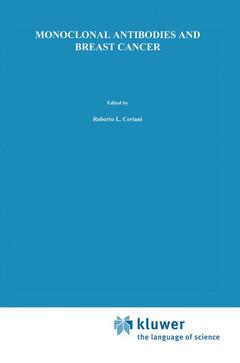Monoclonal Antibodies and Breast Cancer, 1985 Proceedings of the International Workshop on Monoclonal Antibodies and Breast Cancer San Francisco, California — November 8–9, 1984 Developments in Oncology Series, Vol. 35
Langue : Anglais
Coordonnateur : Ceriani R.

Breast cancer, being a disease with very high prevalence in the female population, has permanently attracted the attention of biologists, biochemists, pathologists, surgeons, and oncologists. In the U.S. alone approximately 120,000 new cases are diagnosed and 37,000 deaths a year are recorded as an outcome. Early diagnosis, clear cut prognosis and the hope of new therapeutic approaches has spurred the enthusiasm of researchers, who with the advent of newer methodologies, tried to employ it in different approaches to the breast cancer patient. In spite of the efforts devoted towards the creation of new approaches, reagents and procedures taking advantage of special characteristics of the breast tissue were slow to come. In general, most diagnostic and prognostic techniques were those shared and applied to other carcinomas. In the early seventies we discovered the first sets of antigens associated with breast epithelial tissue both in the mouse and the human. The recognition of such group of molecules, present in the milk fat globule membrane, gave impetus to several studies in these areas. These mammary cell surface antigens proved useful in several diagnostic approaches such as radioimaging, histochemical and serum assay procedures. However, the apparently inherent limitations of polyclonal antibodies reduced the impact of these novel approaches.
Session I.- 1. Immunostaining of Estrogen Receptors in Paraffin Sections of Breast Cancers Using Anti-Estrophilin Monoclonal Antibodies.- 2. Clinical Studies on Cell Surface Estrogen-Regulated Proteins.- 3. MAM-6, a Carcinoma Associated Marker: Preliminary Characterisation and Detection in Sera of Breast Cancer Patients.- 4. Monoclonal Antibodies in the Study of Mammary Development and Neoplasia.- 5. Monoclonal Antibodies in the Study of Cell Lineage, Differentiation and Malignancy in the Human Breast.- 6. Studies with Monoclonal Antibodies to Breast Tumors.- Session II.- 7. Serological Dissection of Human Breast Cancer with Mouse and Human Monoclonal Antibodies.- 8. Potential Clinical Application of a Monoclonal Antibody to a Tumor Associated Glycoprotein (TAG-72).- 9. Immunocytochemistry for the Selection of Hybridomas and the Characterization of Monoclonal Antibodies: Problems, Solutions and Suggestions.- 10. Effector Cells in ADCC with Anti-Breast Cancer Monoclonal Antibodies.- Session III.- 11. Use of Monoclonal Antibodies for Breast Cancer Diagnosis and Prognosis.- 12. Intracellular and Extracellular Keratins of Human Mammary Epithelial Cells.- 13. Breast Cancer Antigens Detected with Human Monoclonal Antibodies.- 14. Monoclonal Antibodies Against Estrogen Receptor: Specificity, Sensitivity and Potential Applications.- Session IV.- 15. Monoclonal Antibodies in the Characterization and Imaging of Human Breast Cancers.- 16. Use of Monoclonal Antibodies to Detect Metastases of Solid Tumors in Lymph Nodes.- 17. Detection of Breast Cancer Using the Monoclonal Antibody 3E-1.2.- 18. An Experimental Model for the Immunological Treatment of Breast Cancer.- 19. Breast Cancer Immunotoxins.- 20. Ductal Carcinoma Antigen: Characteristics, Tissue Distribution and Capacity to Represent a Target for Monoclonal Antibody Therapy.- 21. Non-Immunological Factors Affecting the Localization of Monoclonal Antibodies in Xenografts of Human Breast and Colon Tumors.
Date de parution : 01-2012
Ouvrage de 314 p.
15.5x23.5 cm
Thème de Monoclonal Antibodies and Breast Cancer :
© 2024 LAVOISIER S.A.S.



